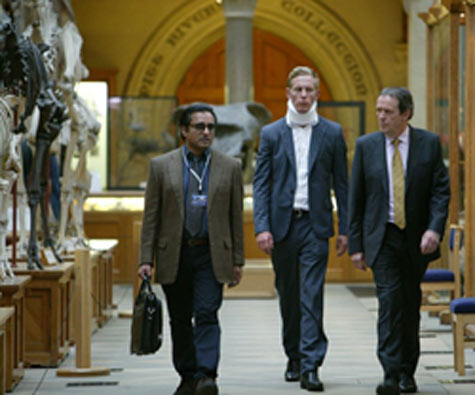 Prepare yourself. This is the beginning of the end for Inspector Lewis. Kevin Whately and Laurence Fox don’t want to do Lewis and Hathaway as a regular thing anymore. Or if they do, past this year’s final series 6, it won’t be for complete three- or four-episode series. Maybe just one or two now and then.
Prepare yourself. This is the beginning of the end for Inspector Lewis. Kevin Whately and Laurence Fox don’t want to do Lewis and Hathaway as a regular thing anymore. Or if they do, past this year’s final series 6, it won’t be for complete three- or four-episode series. Maybe just one or two now and then.
If I’m being objective I can’t really fault Kevin Whately—he’s been Lewis since 1987, and I’d expect that he wants to do something else from time to time. Although… I’ve seen him in other series playing characters who aren’t true blue and I simply refuse to accept it. (There are worse things than being branded as a sweet, soulful doer of good, Mr. Whately. Please remember that.) And Laurence Fox, who’s part of an acting dynasty (his cousin Freddie appeared in “Generation of Vipers” last year and his uncle Edward turns up in episode 3 of this series), has other fish to fry.
I’ll miss them, and I can’t help but remember the genuine contentment I felt back in 2007 when Lewis came back to TV. Fortunately, if this episode is any indication, they’re leaving us something truly Lewis-y to remember them by.
We open with a calm, devout older woman patiently explaining the concept of faith to a smart-alecky student. It’s part of a psychological experiment to study the “mechanism upholding spiritual conviction,” or to put it more simply: why people believe—in God, in the supernatural, in anything.
This, of course, is Hathaway territory as he continues to grapple with his decision to forsake the seminary for the police force. The episode is full of allusions to his struggle; Hathaway’s choice of Gregorian chants as driving music, for instance.
HATHAWAY: Don’t you find the repetition meditative?
LEWIS: If ‘meditative’ is another word for monotonous…
Then there’s the cervical collar Hathaway winds up wearing to ease his whiplash after his car is rear-ended. It couldn’t be more metaphorical if it tried.
All of this happens before the 10-minute mark when Lewis and Hathaway are called to the scene of a murder. A psychic reader named Randolph James is found dead in his office by a devoted client. But we already know Randolph James is a fraud. We also know he’s not Randolph James; he’s Reuben Beatty, a grad student with a young wife and an infant daughter.
Turns out he was killed with a lethal dose of Etorphine, a large-animal tranquilizer, and not your typical murder weapon in Oxford. (It is, however—coincidentally or not—a favorite knock-out drug of Dexter Morgan’s. Is someone on the Lewis crew a Dexter fan?)
Now we need to know:
Why was Beatty masquerading as a psychic?
Why would someone kill him?
Were they were killing Randolph James or Reuben Beatty?
Along the way we’re tossed bits of the occult, potential military/government conspiracy, scientific thought, family baggage, and good old-fashioned jealousy. But in the end psychology is the thing.
The psychological research into belief systems doesn’t sit well with Hathaway, who objects to the hectoring the researchers employ to test the faith of their subjects. “Faith and rationality aren’t mutually exclusive,” Hathaway tells Lewis. Maybe not, but they’re certainly facing off here.

The scenes in the Oxford University Museum of Natural History give us the sort of scenery we expect from Lewis, and more. The architects who designed the neo-Gothic building conceived of it as a “cathedral to science.” Where better for Lewis and Hathaway to engage with a scientist in a discussion about euthanasia?
Then there’s the smug psychic Frank McLean who makes his home in a converted church complete with stained glass windows and altar rail. The concept of “faith” extends to such psychics, who purport to “speak with the dead” and who might not be on the level, but who do provide comfort to the bereaved. If that’s what some people need to help them through their grief, Lewis won’t judge them. He’s still grieving for his wife in his own quiet way. Yet even McLean admits his ability to “cold read” his clients is little more than a parlor trick. “The skill lies in presenting the logical as mystical,” he explains.
Hathaway, ever philosophical, keeps an open mind. “Just because I’m uncomfortable with it doesn’t make it wrong,” he tells Lewis at one point. What he cannot accept are charlatans abusing the trust of vulnerable people. That’s where he and Lewis—and presumably we—agree.
As ever, there is humor, such as when the 6-foot-3 Hathaway describes a man he’s pursuing as a “short guy.” (Aren’t we all, James?)
And as ever, the biggest question is Hathaway himself. For while Lewis always solves the puzzle of the case before him, he never can unravel the enigma that is James Hathaway. If this episode leaves us with one thought it’s that we really need to figure out what makes him tick. And time for that is running out.
Leslie Gilbert Elman is the author of Weird But True: 200 Astounding, Outrageous, and Totally Off the Wall Facts. Follow her on Twitter @leslieelman.
Read all of Leslie Gilbert Elman’s posts for Criminal Element.

Did you notice the secret message in the credits? A new adaptation of The Lady Vanishes starring Tuppence Middleton (who played Vicki in this episode of Inspector Lewis) airs on Masterpiece Mystery in August.
I am out of town, so I missed my Lewis fix. Still, I couldn’t resist reading the recap because I don’t actually watch Lewis for the mystery, so I don’t care about spoilers. I watch Lewis for…Lewis. And Hathaway. And I will be distraught beyond measure when they’re gone.
No spoilers from me, Laura! And I’ll be distraught too. Lewis is one of the good guys.
What???? No more Inspector Lewis???? Yuck. Double yuck. Put me squarely in the distraught column.